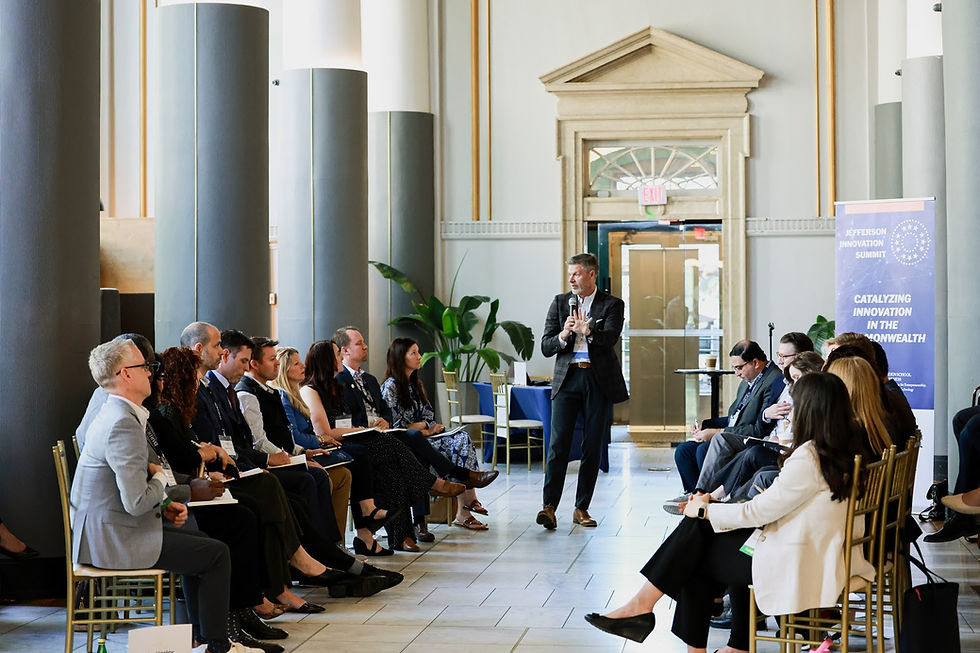UVa Students Win Velocity Tour Pitch Competition
- Sep 23, 2016
- 3 min read

Published on Charlottesville Tomorrow
A pair of University of Virginia-trained biomedical engineers won a $25,000 grant from Gov. Terry McAuliffe’s office Friday at a pitch competition that kicked of the Tom Tom Founders Festival’s Tomtoberfest fall block party.
Payam Pourtaheri and Ameer Shakeel run AgroSpheres LLC and have developed a chemical that degrades pesticides and, they hope, will give farmers better control over their harvests.
Despite a computer problem that left the pair without their pitch presentation, they won over a panel of four judges at the final round of the Virginia Velocity Tour Pitch Competition at The Haven.
AgroSpheres beat out six other companies with ideas in the food and biomedical arena. Pourtaheri and Shakeel’s connection to and desire to stay in Charlottesville helped them stand out, said Ross Baird, CEO of Village Capital, a Washington, D.C.-based investment capital firm.
“Two themes I heard today were ‘keep entrepreneurs here,’ which is a huge problem, and the great thing about Charlottesville is they don’t want to be everything to everybody … they have picked areas to focus on,” Baird, a UVa graduate, said. “The panel saw that they had two massively high-potential UVa kids, so let’s keep them here and give them a shot in the arm.”

Credit: Brian Wheeler, Charlottesville Tomorrow. Doug Muir (at left) shares a prize with the winners of 2016 Virginia Velocity Tour’s Charlottesville pitch competition Ameer Shakeel & Payan Pourtaheri. Their company, Agrospheres LLC, was announced winners by Cville City Councilor Wes Bellamy (at right).
The Virginia Velocity Tour started Monday in Roanoke and visited Richmond, Hampton Roads and Northern Virginia before ending in Charlottesville. Each stop on the tour ended with a $25,000 pitch competition. Pourtaheri and Shakeel were presented a $25,000 check in front of the Tomtoberfest crowd in Lee Park. “We read a World Health Organization article about pesticide poisonings and we thought, ‘Wouldn’t it be great if we could degrade some of these harmful chemicals?’” Pourtaheri said. “Then the farmers we talked to told us about the economic benefit, so we decided it was a win-win.” For vintners and farmers, the decision to spray pesticides is tough. If they do not spray, they run the risk of insects destroying their crops. But spraying also comes with a host of complications, Pourtaheri and Shakeel said. Per Environmental Protection Agency regulations, sprayed crops may not be harvested until a certain amount of the pesticide has degraded. That process can take weeks, during which storms or other poor weather conditions can harm crops. AgroSpheres’ product, if approved, could degrade those chemicals much more quickly, saving growers money, the pair said. While Virginia put up the money for the grants, Village Capital handled day-to-day operations of the tour. For Doug Muir, one of the competition judges and owner of equity firm Muir and Associates, keeping entrepreneurs in Charlottesville will take unifying investors, local government and the university. “We are so scattered around in Charlottesville, we are not all in one place like in a place like Silicon Valley,” he said. “It’s not like we lack talent.” Making a robust network of entrepreneurs will take dedication to a specific identity for Charlottesville, Baird said. “When the ecosystem doesn’t work is when cities say, ‘What have other cities got? We need that, too,’” he said. “What people are doing in Charlottesville are things that actually improve people’s lives.”




